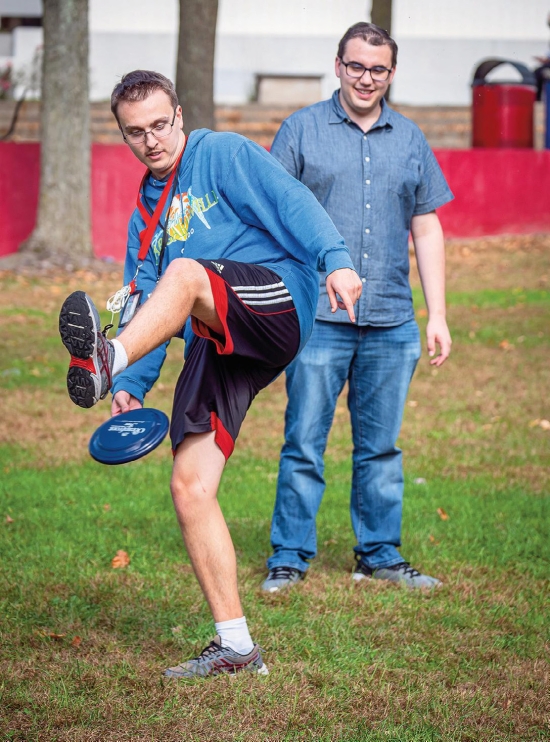
FREE TO BE: Two IAC fellows playing frisbee in the quad; "College is a time for many early adults to learn new information, gain independent living skills, find their personal strengths, develop employment skills, and to grow a sense of identity and self. "
information, gain independent living skills, find their personal strengths, develop employment skills, and to grow a sense of identity and self. Students with ID benefit from being included in all that one is afforded on a college campus.
Outcomes data has begun to evidence that students who have attended an IPSE program increase their likelihood to continue their education, find competitive employment, and have satisfying social lives after graduation (Grigal, et. al. 2021). Not only does IPSE programming increase future opportunities for the students who attend, but it also creates a more inclusive society because students on college campuses are able to learn alongside their peers with significant disabilities. Undoubtedly, furthering the expansion of IPSE programs is one way to create a more inclusive society. Montclair State University is excited to announce that it is expanding its offerings, in order to become a part of the IPSE movement.
MONTCLAIR STATE UNIVERSITY'S CERTIFICATE IN GENERAL EDUCATION STUDIES (CGES)
Montclair State University has established the new Certificate in General Education Studies (CGES), a two-year, credential-granting, commuter program, for students with intellectual disabilities who are motivated to learn in a college environment. CGES aims to provide an inclusive educational experience, where students take
a selection of undergraduate courses determined by their interests. Through a peer supported and intentional course of study, CGES enables students to further develop their skills for self-advocacy, intellectual pursuit, and employment.
A college education often strives to prepare students with experiences, skills, and knowledge, for employment upon graduation. The same is true for CGES. Through a liberal arts-based curriculum and person-centered planning, CGES will seek to support students in identifying an academic focus aligned to career interests. During the 2nd year of the student's program, they will be expected to complete a supported work experience related to their career interests, preparing them for life after graduation. College campuses are often hubs for developing professional networks and friendships. Beyond the classroom, students in CGES have opportunities to engage in campus life activities, including: exercising at the Student Recreation Center, joining student-led organizations, and participating in the daily social activities offered to all students. Ultimately, CGES offers opportunities for all Montclair students to benefit from interdependence, to engage with diverse perspectives and lived experiences, and develop a meaningful understanding of disability justice.
CGES is currently recruiting students for the inaugural class, which will start next Fall Semester in 2024. For more information please visit, montclair.edu/teaching-and-learning/academic-programs/certificate-in-general- education-studies-cges. •
References
Cosier, M., Causton, J. & Theoharis, G. (2013). Does Access Matter? Time in General Education and Achievement for Students With Disabilities. Remedial and Special Education, 34(6), doi.org/10.1177/07419325134854
Grigal, M., Hart, D., Papay, C., Wu, X., Lazo, R., Smith, F., & Domin, D. (2021). Executive Summary of the Annual Report of the TPSID Model Demonstration Projects (Year Five, 2019-2020). Think College Fast Facts, Issue No. 30. Boston, MA: University of Massachusetts Boston, Institute for Community Inclusion.
(ED.GOV). Higher Education Opportunity Act. www2.ed.gov/policy/highered/leg/hea08/index.html
Montclair State University. (2023). Certificate of General Education Studies montclair.edu/teaching-and-learning/academic-programs/certificate-in-general-education-stud- ies-cges/
Office of Special Education Programs (2022, May). OSEP Fast Facts: Educational Environments of School Aged Children with Disabilities. https://sites.ed.gov/idea/osep-fast-facts-educational-environments-school-aged-children-disabilities/
- Think College. (2023). thinkcollege.net
- Think College. (2023). College Search. thinkcollege.net/college-search
ABOUT THE AUTHORS:
Dr. Jessica Bacon is an Associate Professor in the Department of Teaching and Learning at Montclair State University. Dr. Bacon coordinates programs in inclusive education and is a co-founder of the Increasing Access to College project and Certificate of General Education Studies, both of which offer inclusive higher education opportunities to people with intellectual disability labels at Montclair. Dr. Bacon's research is informed by disability studies and she investigates various topics related to inclusive education through a critical and intersectional lens. Dr. Bacon has recently published in journals such as Teaching Disability Studies, Critical Education, and Young Exceptional Children. Kathryn Leonard is the Director of the Certificate in General Education Studies program at Montclair State University. Kathryn is a licensed social worker in the state of New York and earned a Masters of Science in Social Work from Columbia University School of Social Work with a concentration in Health, Mental Health, and Disabilities. She also has a Bachelor of Arts degree in Psychology with Minors in Disability Studies and Cognitive Science from the University of Delaware.